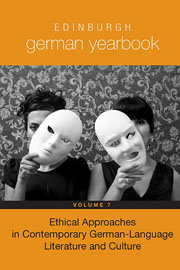 Edinburgh German Yearbook 7
Edinburgh German Yearbook 7 Published online by Cambridge University Press: 05 December 2013
At the beginning of the twenty-first century, there is a pressing need to engage critically with the way human beings belong to the material world. Under the impact of globalization and digital technologies, ethical dilemmas posed by materiality are changing and evolving rapidly. In ecological terms, for example, the need for sustain-ability, which requires the reduction of consumption by a wealthy minority and the simultaneous decoupling of development from resource use, presents challenges of unprecedented scale and urgency. On a social level, meanwhile, the disconnect between the global impact of consumption and local, lived practice is felt particularly keenly in our daily interactions with things. While in the developing world many do not have the material resources to sustain life itself, affluent consumers in wealthy economies are frustrated by choice and by the need to navigate competing discourses of sustainability in order to make their purchases in an ethical way. At the same time, the rapid development of information technologies has profoundly unsettled our psychological and physiological relationships with materiality, prompting anxious questions about embodiment and disembodiment, such as “how can we be present yet also absent?” and “what is a self if it is not in a body?” One example of the way in which such concerns coalesce is the current media and scientific interest in the phenomenon of hoarding, which appears to “speak to and about our moment.”
To save this book to your Kindle, first ensure [email protected] is added to your Approved Personal Document E-mail List under your Personal Document Settings on the Manage Your Content and Devices page of your Amazon account. Then enter the ‘name’ part of your Kindle email address below. Find out more about saving to your Kindle.
Note you can select to save to either the @free.kindle.com or @kindle.com variations. ‘@free.kindle.com’ emails are free but can only be saved to your device when it is connected to wi-fi. ‘@kindle.com’ emails can be delivered even when you are not connected to wi-fi, but note that service fees apply.
Find out more about the Kindle Personal Document Service.
To save content items to your account, please confirm that you agree to abide by our usage policies. If this is the first time you use this feature, you will be asked to authorise Cambridge Core to connect with your account. Find out more about saving content to Dropbox.
To save content items to your account, please confirm that you agree to abide by our usage policies. If this is the first time you use this feature, you will be asked to authorise Cambridge Core to connect with your account. Find out more about saving content to Google Drive.